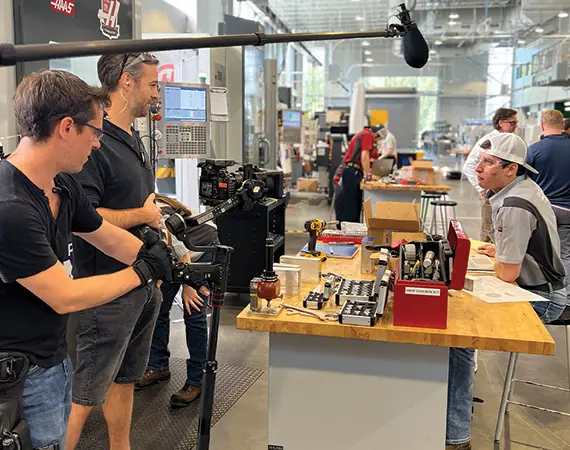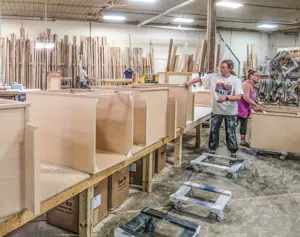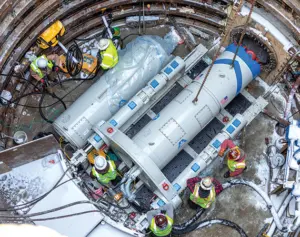You’ve heard of Cinderella stories in sports — the kind where a team isn’t supposed to win the championship but through grit, determination, and a sheer will to win, they’re victorious in the end.
Meet Austyn Warren, Ivey Wadman Vehrenkamp, Joe Schultz, Ellery Kiesel and Brad Bishop, the students from Rick Hengel’s machining program at Minnesota State College Southeast in Winona.
These students entered a national competition they’d never attempted before and emerged national champs, taking home the $100,000 prize and enough smiles to fill a college cafeteria.
And while they were at nationals besting teams that had been winning machining competitions for years, the MSC team’s classmates were back home in Winona going through commencement.
“The day we were supposed to be graduating, we’d already got the news that we won,” says Wadman Vehrenkamp. “So missing commencement didn’t really seem like a big deal.”
The Cinderella story began months before when instructors Rick Hengel and Todd Ives noticed a promotional booth at an educators’ conference identified as Project MFG’s National Advanced Manufacturing Championships.
They’d walked by the booth several times without engaging its occupants, Hengel says, because they assumed Project MFG was selling something. When they finally did, they were intrigued. The competition was free, they were told, and if they continue to win, they can keep moving up and, eventually, make it all the way to nationals.
Project MFG’s competition is a problem-solving game based on real-world scenarios. Each phase works the same way: Teams are given specifications for a part and must then use their machining skills to execute it. They are judged on how well the machining equipment is programmed, how well parts are welded, how long it takes to get it done, and overall quality.
There was just one problem: At the higher levels of competition, the work would require a five-axis CNC machine, in which a cutting tool moves in five directions, and neither Hengel, Ives or his students had much experience with one — and the college didn’t have one in its shop.
Hengel says they decided that they’d worry about the intricacies of a five-axis machine when they got that far in the competition. It was more important, he says, to have fun in an event that allowed them to use the skills they were learning in the classroom. So, it was on to the competition.
For the initial phase of competition, teams compete at their schools and send the finished parts to Project MFG. And then they wait.
“In January I got an email saying, ‘Congratulations, you are in the Top 16,’” Hengel says. “But those regional finals were in Wichita, Kan., and on a five-axis machine. So, we had to scramble to figure out how to program and run a five-axis machine.”
Following a lead from a local salesman, Hengel contacted Rushford Manufacturing to see if his students might start learning on one of their three five-axis machines.
“One of their workers worked with us all day and stayed late into the night so we could run what we had programmed and try to prove things out,” Hengel says.
For regional finals, teams were sent models for the actual pieces they would be producing when they got to the competition. This gives teams a chance to practice programming on a five-axis machine. But then, at the actual competition, the instructions and specifications for that piece will have changed. This requires students to reprogram the machine. It’s not starting from scratch, but it does require students to think on the fly, make quick decisions, and work as a team.
Student Austyn Warren says Rushford’s help was invaluable.
“Being able to prove out a program on a machine like that is a huge advantage going into these competitions. A lot of it is just trial and error. You have to be able to run the program to see what it’s actually going to do and then make your adjustments on the fly. Being able to use Rushford’s machine was a big difference maker for us.”
After a dazzling finish at the Wichita regionals, the team advanced to nationals. There, the competition was tough, even intimidating.
“There was this team from Calhoun Community College, located in Alabama, that took first place in every category in regionals,” Hengel says. “So going into nationals, I was thinking there’s no way we can beat them.”
But you don’t win championships because you’re supposed to win. You have to play the game. And the team from MSC wasn’t about to quit.
Warren says there was a moment after they’d heard they won a trip to nationals where team members felt like just getting there was good enough. Then that feeling transitioned to “let’s at least do better than fourth.” And then that feeling transitioned again.
“We’re thinking, we’ve gotten this close — shouldn’t we go all in and make a leap at trying to win this thing?” Warren says.
They knew it was a long shot, and they knew it was going to require a ton of prep work, especially for Warren who was the lead on programming the five-axis machine. And all team members had external forces adding more stress to the mix — classes, exams, and capstone projects.
After another trip to Rushford, the team headed east to North Carolina.
Wadman Vehrenkamp says machining parts takes on a new dimension when you’re being watched by competitors and camera crews, not to mention teammates who are relying on you.
“It was like a fishbowl,” she says. “I would look up and see what the time is and there are random people staring at me.”
At the end of the medical manufacturing showdown, the MSC team — after making hip replacement parts — emerged the winner. Each student who participated received a $12,500 check, with the remainder of the $100,000 going to Hengel’s program at MSC.
Hengel says he hopes the team’s success will shine a bright light on his program. He also hopes people remember that the team couldn’t have been successful without each individual team members’ work ethic and talent.
“It takes hard work, but it also takes talent,” he adds. “You can work your butt off and never get to the level that these students are at. So, what they have accomplished is pretty impressive.”
Return to the Fall 2023 issue of Enterprise Minnesota® magazine.


